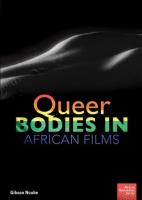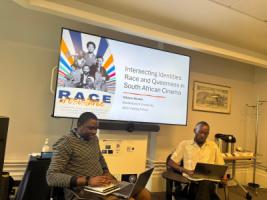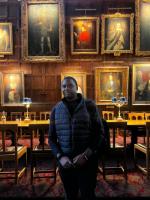In 2023, Gibson Ncube was hosted by the Faculty of Medieval and Modern Languages, University of Oxford and TORCH as part of the Africa Oxford Visiting Fellowship Programme.
DB: What were you looking for as you applied to the @AfOx visiting fellowship? What did you do during your stay in Oxford? Was it different than what you expected?
GN: When I applied for the AfOx Visiting Fellowship, I was searching for an opportunity to advance my research and scholarship. Especially, I wished to engage with leading scholars and contribute to important conversations in my field. The fellowship was one-year long and included a six-week in person stint at Oxford.

Before my arrival at Oxford, my host Dr Dorothée Boulanger and I organised an online seminar series entitled “Advancements and future directions in queer African studies”. This two-part seminar series brought together young scholars of African queer studies from South Africa, the UK and the Netherlands. The seminar series showcased the groundbreaking work of postgraduate students and early-career scholars and reflected on the multifaceted intersections of queer identities, activism, and narratives in African context.
During my six weeks in Oxford, I achieved more than I anticipated. I collaborated with Dr Boulanger at the Department of Medieval and Modern Languages. I was also affiliated with All Souls College. These different spaces offered a variety of enriching academic events and engagements. The first event was a discussion with Dr Boulanger on my book, Queer Bodies in African Films. The discussion sparked insightful discussions on queerness in Africa and the role of film in representing it. This was followed by a presentation on “Intersecting Identities: Race and Queerness in
South African Cinema” which was hosted by the Race and Resistance Research Hub. The presentation was followed by a discussion which was facilitated by Mwangi Mwauru, who is presently the Student Engagement Officer at the Africa Oxford Initiative.
I also had the opportunity to present at the Queer and Trans History Now Conference which was held at Mansfield College. My paper, “Hidden histories, painted pride: Desire Marea’s queer Zulu soldiers”, received the best presentation award.
These experiences and the professional connections that I made far exceeded my expectations.

DB: You are a leading expert in African queer studies, with innumerable articles and two books that examine queer literature and cinema across the continent. Can you tell us a bit about your research? What are, from your point of view, the major debates shaping the field of African queer studies? How do they differ from queer studies in the global North, or, as far as you know, in other regions of the Global South?
GN: My research focuses on how cultural productions, especially literature and cinema, represent queer lived experiences, desires and identities in different contexts across the African continent. I am particularly interested in how cultural texts challenge normative structures and offer alternative ways of imagining intimacy, belonging and kinship. My two books, La sexualité queer au Maghreb à travers la littérature (2018) and Queer Bodies in African Films (2022) explore these themes by examining works from a wide range of countries and regions. In this examination, I have foregrounded the intersection of queerness with other identities such as gender, race, class, and nationality.
In my opinion, one of the important debates shaping African queer studies lies in the tension between local and global queer discourses. African queer studies often proffers a critique of the dominance of Global North epistemologies and frameworks, which often fail to capture adequately the specificities of African contexts. Colonial histories, indigenous knowledges, and contemporary power dynamics have been interrogated by scholars especially in the ways they inform sexual and gender diversity. A related debate, as in many in the broad field of African studies, relates to decolonising queer studies. This has involved devising methodologies and theoretical frameworks that emerge from African epistemologies rather than adapting those from the Global North.
Queer studies in other regions of the Global South, for example in Latin America and South Asia, also grapple with similar decolonial and intersectional critiques. However, they draw on their unique cultural, historical, and geopolitical realities. For example, I have found the work of Srila Roy very generative in making sense of how caste and religious identities shape queer narratives in India.
Importantly, African queer studies is not merely concerned with documenting or theorizing queerness; it is also about creating spaces for alternative ways of being and knowing that resist the violences of erasure and homogenization. This, I believe, makes it a dynamic and politically critical field that is continuously evolving.
DB: Can you tell us a bit about teaching modern languages (French, in your case) in Global South higher education institutions? South Africa, where you are currently based, was a focal point to think about the decolonisation of education? What have been the innovations and pitfalls of these student-led movements, from a literature and language-teaching perspective?

GN: The teaching of modern foreign languages, such as French, in institutions of higher education in the Global South presents a unique set of opportunities and challenges. In South Africa, where I am based, the teaching of French involves not only equipping students with linguistic competencies. It is also a question of capacitating them with critical thinking skills and intercultural competencies so that they are able to engage in robust and critical ways about not just French or Francophone literatures and cultures but with broader cultural, historical, and political issues across the world. This is particularly important in a context like that of South Africa, where the legacies of colonialism and apartheid and other power dynamics shape the way languages are perceived and taught. At Stellenbosch University, especially, the teaching of foreign languages like French is positioned within the institution’s advancement of multilingualism.
The year 2015 saw the emergence of student-led movements in South Africa. These decolonial movements included #FeesMustFall and #RhodesMustFall and they brought to the fore critical questions: How is knowledge produced and how is it transmitted? Which or whose knowledge matters and should be taught in the classrooms? How do curricula perpetuate or disrupt colonial hierarchies? In foreign language teaching, these movements prompted an important shift from traditional, Eurocentric pedagogies to more context-sensitive approaches. For example, French modules now increasingly incorporate Francophone African and Caribbean texts and films. Teaching these works alongside those of European (Belgian, French, Swiss) and Canadian authors has enabled students to grapple with questions of identity, migration, and cultural hybridity. This approach, in my view, has progressively made the foreign language classroom a veritable space for critical engagement rather than the mere passive assimilation of language.
However, I must hasten to point out that these movements have also faced significant challenges. One drawback has been the risk of tokenism in which institutions superficially add African content to their syllabi without fundamentally rethinking the pedagogical frameworks or power structures that underpin the curriculum.
From a literature and language-teaching point of view, one of the most innovative effects has been the incorporation of multilingual approaches. This includes encouraging comparative analyses between Francophone and local literatures and languages. Local languages are not seen as a hindrance to learning French. Rather, by drawing similarities with their own languages, students are able to make better sense of French.
DB: For those of us less acquainted with African queer literature and cinema, could you give two reading recommendations, one for a book in English, the other for a book in French?
GN: For a book in English, I recommend Akwaeke Emezi’s The Death of Vivek Oji. Set in Nigeria, this novel explores how queerness intersects with themes of love and loss. Emezi’s prose is at once evocative, intimate, and profound.
For a book in French, I would suggest the semi-autobiographical novel L’armée du salut by Moroccan writer Abdellah Taïa. It captures the difficulty of growing up queer in North Africa. This novel highlights how religion and culture make it difficult for the juvenile protagonist to embrace his identity.